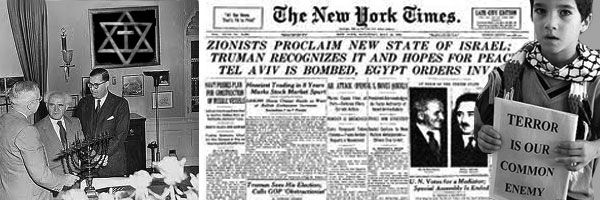Deep-rooted Christian tradition has put its mark on British, and US policies in Mideast
![]() FUNDAMENTALISM IS the problem: that assertion defines the diagnostic mantra of Middle East conflict. The Jewish settlers’ “Bloc of the Faith’’ movement (Gush Emunim), with the agenda of restoring biblical Israel, is discussed as one instance of fundamentalism. Religious jihadists, aiming to re-establish the lost Caliphate of Islam, are discussed as another. Wacky Christians are sometimes spoken of, like the mentally unbalanced Australian who set fire to the Al Aqsa Mosque in Jerusalem in 1969.
FUNDAMENTALISM IS the problem: that assertion defines the diagnostic mantra of Middle East conflict. The Jewish settlers’ “Bloc of the Faith’’ movement (Gush Emunim), with the agenda of restoring biblical Israel, is discussed as one instance of fundamentalism. Religious jihadists, aiming to re-establish the lost Caliphate of Islam, are discussed as another. Wacky Christians are sometimes spoken of, like the mentally unbalanced Australian who set fire to the Al Aqsa Mosque in Jerusalem in 1969.
But the word fundamentalism can obscure as much as it illuminates, especially in the way it seems to lump the sources of trouble on the extreme edge of belief. What if a decidedly mainstream tradition, rooted not in the Middle East but in Britain and America, is a historic key to the tangle that so far resists every effort at unknotting? Not wacky Christians, but the ordinary faithful. What if fundamentalism, in other words, is not the crime but the evidence — evidence of a destructive, yet widespread religious attitude that contributes to the political impasse that continues to stymie Palestinian and Israeli peace negotiators?
Christian Zionism is shorthand for the idea that the return of Jews to the Holy Land is a pre-requisite for the return of Jesus the Messiah, and the final redemption of the world. Believers who take this notion literally (and are understood, in that sense, to be fundamentalist) have been central players in the drama of Palestine for almost two centuries. A particular biblical verse seized the imagination of such Christians. (“O that the salvation Of Israel was come out of Zion! When God bringeth back the captivity of his people, Jacob shall rejoice and Israel shall be glad’’ — Psalm 56:6. St. Paul cited this verse in Romans 11:26, and Christians took it from there.)
This idea of Jewish return to Zion as the climax of salvation history has resonance dating to the Babylonian Captivity nearly six centuries before Christ. No surprise, perhaps, that the enthused religious “awakenings’’ of 19th-century evangelical Protestants, therefore, jelled around the literal restoration of Jews to their traditional homeland. We saw in a previous column how Catholicism regarded the return of Jews as anathema, but the so-called “restorationist’’ Protestant concern for Jews was not truly friendly. Rather, the restored Jews were only to be instruments of the final triumph of Christianity. Jews again in Israel would be faced with the choice of conversion or damnation.
This might seem like esoteric religious mumbo-jumbo, but it centrally motivated two of the three most important elements in the establishment and survival of the state of Israel — British intervention in Palestine and American support for the Jewish state (the third element, of course, is Jewish resolve itself). Yes, other factors always counted, like imperial expansion, secular Zionism, oil reserves, and superpower politics.
But Christian religious fervor was igniting and sustaining. Thus, when the British prime minister and onetime Baptist lay preacher Lloyd George dispatched Field Marshal Edmund Allenby to Palestine in 1917, neither military nor political strategy was paramount. George told Allenby to capture “Jerusalem before Christmas as a Christmas present for the British people.’’

The Holy Land was to be the place of a dream rescue from the horror of the trenches. That the dream was unreal, of course, is why it did not include the Arabs who already lived in Palestine. It was a 19th-century British Christian restorationist who coined the mistaken and still fateful phrase “a land without a people for a people without a land.’’
Christian Restorationism drove a large European arrival in Palestine. The West Jerusalem area known as “the German Colony,’’ for example, was settled by millennial-minded German evangelicals who came to convert Jews. So, too, “the American Colony,’’ the vestige of which remains in the chic East Jerusalem hotel of that name. Indeed, Christian Zionism grew even more powerful in the United States than in Europe.
Between a third and a half of all mid-19th century Americans were evangelical Christians, and this vision enlivened most of them. What began as an obsession of the devout became general, affecting even so religiously detached a figure as Abraham Lincoln. “Restoring the Jews to their national home in Palestine,’’ he wrote in 1863, “is a noble dream and one shared by many Americans.’’ Always, the imagined Jewish achievement was implicitly to be at the service not of Jewish vindication, but of an eschatological Christian triumph.
We noted in an earlier column that the Vatican’s 1948 refusal to recognize the state of Israel reflected the Catholic theology of Jewish dispersal. In a similar, if opposite, way the evangelical theology of Jewish restoration was part of what prompted President Harry S. Truman’s recognition of Israel within hours of its declaration of independence. Yes, Truman had political (an upcoming election) and moral (rescuing Hitler’s victims) reasons for the action, but, his lifelong association with the Christian Zionist agenda, as a Baptist and member of the American Christian Palestine Committee, had already deeply prepared him.
US policy ever since has similarly reflected a mixture of power politics, electoral considerations, and profound moral commitment. Yet Americans are properly proud of what Truman did. Most realize that whatever the complexity of his motives, supporting Israel was the right thing to do. Alas, as was true of those 19th-century Christian restorationists, this vision readily lost sight of the actual existence and life conditions of Arabs and Palestinians. 1948 was momentous for them, too, and they still await full recognition of their own.
Christian religious fervor, having become a mainly subliminal current, broke into the open as an acknowledged pillar of US Middle East policy with the arrival of the so-called Religious Right. The avatar of that arrival was Reverend Jerry Falwell, leader of the so-called Moral Majority. With President Ronald Reagan, who met with Falwell more often than with any other religious leader, Falwell revitalized the Christian Zionist fantasy of a restored Jewish nation as a prelude to Christ’s return.
Together, Reagan and Falwell laid the groundwork both for the reinvention of the Republican Party as the vanguard of American Christian nationalism, and for the rock-solid contemporary alliance between right-wing Christians, powerfully centered in the US Congress, and the government of Israel. The more recalcitrant that government, the more such Christians like it, not only because they envision a “biblical’’ Israel throughout Palestine, but also because, since 9/11, they see Israel as a front in the anti-Islamic clash of civilizations. Never mind that most Israelis see no such thing. Most Americans, meanwhile, watch in befuddlement as openly Christian notes of identity intrude ever more powerfully on the public square, threatening to make faith in Jesus a touchstone of full citizenship.
The irony here is breathtaking. Pursuing an ultimate form of realpolitik, Israeli leaders happily collaborate with a reactionary American religious movement which, while having learned to downplay its Jew-denigrating End Time theology, nevertheless aims in its very essence at the elimination of Jewish faith. Israeli leaders, in their dependence on such Christians, exchange short-term benefits for long-term jeopardy. American Christian Zionism is a particularly lethal form of contemporary fundamentalism. Theologically uncritical and dangerously triumphalist, it is bad for Israel, Palestine, America, and peace.
James Carroll’s column appears regularly in The Boston Globe. This is the fourth of six special columns, which will appear every other week. His new book, coming early in 2011, is “Jerusalem, Jerusalem: The Ancient City that Ignited the Modern World.’’ Visit his original post at The Boston Globe










